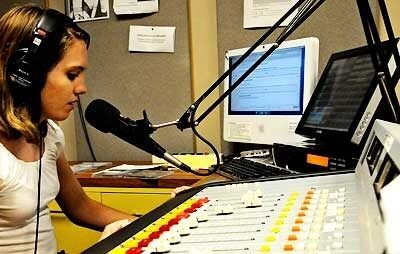When was the last time you listened to your campus radio station?
If you’re like most college students, the answer is probably never. Undergrads across the country spend hours producing shows that stand apart from the unchanging stream of Top 40 hits that commercial radio relies on, yet they often go unheard by their peers.
College students are a part of the age group that’s abandoned radio faster than anyone else in the U.S. With iPods, music-enabled smart phones and websites like Pandora and 8tracks, it isn’t hard to see why radio listenership of all types has been on the decline. While there is a tendency to pass up radio for more immediate and convenient ways to listen to music, dedicated groups of students on thousands of college campuses are trying to reverse the trend.
For these stations, making a presence for themselves online has been the key to avoiding some of the problems plaguing the rest of the radio industry. Student-run stations like Georgetown University’s WGTB and The University of Texas at Austin’s KVRX not only broadcast live on the Internet, but maintain blogs with album and concert reviews to accompany their unique programming.
With all the time it takes to create their stations’ content, it’s a struggle for these students to juggle their classes, jobs and friends on top of maintaining entire stations that provide a quality alternative to the format of regular FM radio.
“I'm a senior and working on my undergrad thesis that's required for graduation. Between that and my campus job, other classes, and [working at Longwood University’s radio station] WMLU, it can get really hectic,” said Ashley Bowles, a student at Longwood who serves as WMLU’s General Manager.
Despite the stress of balancing the roles of friend, student and employee, she believes working in college radio is definitely a worthwhile experience.
“I originally got involved in radio because my university didn't offer radio courses, so if I wanted radio on my resume, joining WMLU was the way to do it. Looking back, I don't think I realized that the station and its members would become a second family for me,” said Bowles.
Whether they originally joined their school’s station out of sheer curiosity or to bolster a budding broadcast journalism career, college DJ’s put their hearts into creating shows that feature music other students won’t hear on commercial airwaves.
FROM OBSCURE TO ONLINE
That might suggest that college radio hasn’t changed from that ‘90s stereotype of plaid-wearing grunge kids playing obscure alt-rock, but stations today strike a balance between that idea of college radio and the music that’s popular among other students.
“College Radio was a genre in the early 1990s, but I do not see critics writing much about it these days. I'm sure one reason for this is that there are so many different college radio stations out there, all with their own programming directors,” said Claire Morra, general manager of Virginia Commonwealth University’s station, WVCW.
Adding an online element to their stations allows college students full control of their programming and the ability to tailor it to whatever kind of audience they want to attract.
“What's unique about WVCW is that we play almost every genre of music, and how often we play each genre has been decided through multiple surveys from the VCU campus and the expertise in our music department,” said Joel Austin, a VCU student and WVCW’s program director.
“Although this goes against popular belief that college radio only plays obscure, alternative stuff, WVCW is playing obscure music from every genre with the goal of that the listener finds something in our playlist and that takes them on a whole new musical journey where they venture out of the musical realm of Yo Gabba Gabba and Glee,” Austin said.
While commercial radio may have fallen out of favor with the under-30 crowd, college students maintain stations with innovative programming that their peers shouldn’t be missing out on.



















